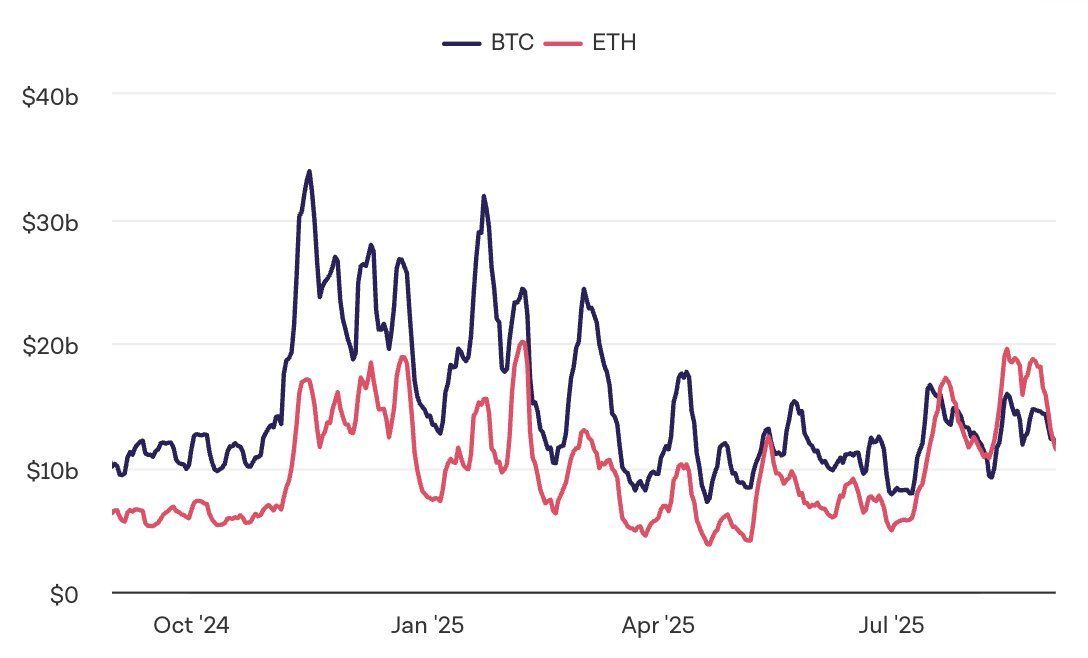🚨 Historic Shift on CEXs
For the first time in 7 years, $ETH > $BTC in 7-day spot volume, per The Block. 🔁 👉 Bitcoin whales are rotating heavily into Ethereum.
With capital reallocating + rate cut anticipation, analysts now eye fresh ATHs in Q4 for majors.
#Ethereum #Bitcoin #cryptocurrency #blockchain



Carmelita
2025-09-04 16:37
🚨 Historic Shift on CEXs
Disclaimer:Contains third-party content. Not financial advice.
See Terms and Conditions.


How Does Ethereum (ETH) Differ from Bitcoin (BTC) in Purpose and Function?
Understanding the fundamental differences between Ethereum and Bitcoin is essential for anyone interested in cryptocurrencies. While both are digital assets operating on blockchain technology, their core purposes, functionalities, and development trajectories set them apart significantly. This article explores these distinctions to provide a clear picture of what makes each unique.
The Primary Purpose of Bitcoin vs. Ethereum
Bitcoin was created with the primary goal of serving as a decentralized digital currency that acts as a store of value and medium of exchange. Launched in 2009 by an anonymous entity known as Satoshi Nakamoto, Bitcoin aimed to offer an alternative to traditional fiat currencies by enabling peer-to-peer transactions without intermediaries like banks or governments. Its limited supply—capped at 21 million coins—reinforces its role as a scarce asset similar to gold.
Ethereum, introduced in 2015 by Vitalik Buterin and others, extends beyond simple currency functions. It is designed as a decentralized platform that facilitates the creation and execution of smart contracts and decentralized applications (dApps). Unlike Bitcoin’s focus on being a digital cash system, Ethereum aims to be an open-source blockchain infrastructure where developers can build complex programmable applications across various sectors such as finance, gaming, supply chain management, and more.
Functional Differences: How Do They Work?
Bitcoin's functionality centers around facilitating secure peer-to-peer transactions using its proof-of-work (PoW) consensus mechanism. Miners validate transactions by solving complex mathematical problems—a process that requires significant energy consumption but ensures network security against tampering or double-spending attacks. The blockchain ledger records all transactions transparently while maintaining decentralization.
Ethereum's capabilities are broader due to its support for smart contracts—self-executing agreements written directly into code—and dApps that run on its blockchain network. These features enable automation across multiple use cases like financial services (DeFi), voting systems, identity verification systems, etc., without relying on centralized authorities or intermediaries.
Furthermore, Ethereum transitioned from PoW to proof-of-stake (PoS) with "The Merge" completed in September 2022—a move aimed at reducing energy consumption while increasing scalability through mechanisms like staking validators instead of mining.
Recent Developments Shaping Their Evolution
Both cryptocurrencies have undergone significant updates recently that influence their future potential:
Bitcoin:
- Halving Events: Occurring approximately every four years; the latest was in May 2020 with another scheduled for May 2024. These events reduce miners' rewards by half and help control inflation.
- Regulatory Environment: In 2023, U.S regulators clarified that Bitcoin is considered a commodity rather than security—this distinction has helped stabilize markets but also introduces regulatory risks depending on jurisdictional changes worldwide.
Ethereum:
- Transition to Proof-of-Stake: Known as "The Merge," this upgrade marked Ethereum’s shift away from energy-intensive PoW towards more sustainable PoS consensus mechanisms.
- Layer 2 Scaling Solutions: To address scalability issues inherent in blockchain networks like high transaction fees or slow processing times during peak demand periods — solutions such as Polygon or Arbitrum are being implemented effectively without compromising decentralization or security standards.
These developments reflect ongoing efforts within each ecosystem toward improving efficiency while addressing environmental concerns—a critical factor influencing mainstream adoption.
Potential Risks That Could Impact Each Network
Despite their advancements’ promising outlooks; both networks face challenges:
Bitcoin Risks:
- Regulatory crackdowns could threaten widespread acceptance if governments impose restrictions or bans.
- Security vulnerabilities remain possible; although rare due to robust cryptography practices used within the network.
Ethereum Risks:
- Transition complexities associated with moving entirely from PoW-based validation might introduce unforeseen bugs affecting stability.
- Scalability issues persist despite Layer 2 solutions; if these do not scale adequately under increased demand levels—which could lead to higher transaction costs—the user experience may suffer significantly.
Understanding these risks helps investors evaluate long-term sustainability prospects for each cryptocurrency within evolving regulatory landscapes and technological environments.
Comparing Key Facts & Timeline Milestones
| Aspect | Bitcoin | Ethereum |
|---|---|---|
| Year Created | 2009 | 2015 |
| Consensus Mechanism | Proof-of-Work (PoW) | Transitioned from PoW → Proof-of-Stake (PoS) in September 2022 |
| Main Use Case | Digital store of value & medium of exchange | Platform for smart contracts & decentralized apps |
| Notable Events | Last halving occurred May 2020; next scheduled for May 2024 | Completed transition via "The Merge" in September 2022 |
This timeline highlights how both projects have evolved over time—from initial creation focusing solely on currency functions toward broader utility roles driven by technological upgrades.
Final Thoughts: Distinct Roles Within Cryptocurrency Ecosystem
While they share underlying blockchain technology principles—decentralization transparency—they serve different needs within the crypto space:
Bitcoin remains primarily viewed as “digital gold,” emphasizing scarcity preservation alongside secure transfer capabilities.
Ethereum, meanwhile, positions itself more broadly—as an adaptable platform enabling innovative applications through programmable smart contracts which can revolutionize industries beyond finance alone.
By understanding these core differences regarding purpose and function—and keeping abreast of recent developments—you can better assess how each might fit into your investment strategy or technological interests moving forward.
Keywords: Bitcoin vs Ethereum, cryptocurrency purpose, blockchain platforms, smart contracts, proof-of-stake vs proof-of-work, DeFi development, cryptocurrency risks.
